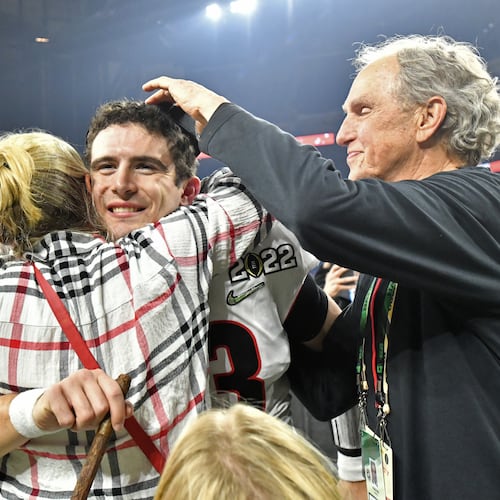Masters winners cover the spectrum from legends to huh, really? From the prestigious firm of Nicklaus, Palmer, Woods, Hogan and Snead. To the — how to put this kindly — less imposing conglomeration of, say, Coody, Willett, Immelman and Keiser.
But no matter their place on the great golf pyramid, they all have earned the right to haunt the upstairs champions locker room at Augusta National forevermore.
Now, take Masters runners-up, those souls who have come close enough to almost touch the hem of a green jacket only to have it yoinked away on a spring Sunday. History’s almost champions. What’s really striking is the recent quality of these silver medalists.
To review that roster is to trip over some of the biggest names in the game, reminding us that just because you’re really good doesn’t mean a green jacket is a given.
Over the past five Masters, that group of second-place finishers has included four players who have been top-ranked in the world — Dustin Johnson (the current No. 1), Brooks Koepka, Justin Rose and Lee Westwood. Then there’s the current No. 7 player and spellcheck nightmare, Xander Schauffele. And another guy highly ranked both as a player and a pitch man, Rickie Fowler. For all their acclaim, what these six have in common is a big gap in their resume where a first Masters title would fit so nicely.
Almost winning the Masters doesn’t come with a nice consolation prize like a green vest or any kind of real lasting fame unless you’re Roberto De Vicenzo and sign an incorrect scorecard. Sometimes, as in the case of three-time runner-up and Greek tragedy in double-knit Greg Norman, it can become a stigma.
Among the recent runners-up, the saga of Rose is particularly poignant. Here is a player with an Olympic gold medal and a U.S. Open title to his name whose game has been so agreeable with Augusta National. And yet he is stuck in second, finishing there in 2015 when shooting 14 under only got him within four of Jordan Spieth and again in 2017, losing in a playoff to Sergio Garcia.
As Rose said upon returning to the scene in 2018, “I don’t feel bad about it whatsoever, but still, clearly, it’s whenever you lose a playoff in a major, it’s one of those moments that you look back on and think what might have been.”
There being no horseshoes or hand grenades involved in golf, coming close does really count for a lot. In fact, knowing how close you came to this great prize may make the experience that much more wrenching.
For those who have dared to contend to the end, Rose offers this lesson: “You’re going to win majors and you’re going to lose majors, but you’ve got to be willing to lose them. You’ve got to put yourself out there. You’ve got to hit the top of the leaderboard. There’s a lot of pressure out there and if you’re not willing to enjoy it, then you’re not ready to win these tournaments.”
Last year featured what may have been the most distinguished collection of second-place finishers since 1985 when Seve Ballesteros, Raymond Floyd and Curtis Strange ended two back of Bernhard Langer.
Getting out of the way and allowing the Tiger Woods return-to-glory story play through were Johnson, Koepka and Schauffele.
Johnson made a run at the end with birdies on four of his closing six holes to get within one of Woods. He has finished top 10 in each of his last four Masters, with the second last year his highest finish. He’s portraying not one bit of disappointment coming into this first November Masters.
“The last couple Masters I played well and kind of been in contention,” he said. “I enjoy playing the golf course, I think it sets up well for me. Obviously, no matter how much I like it or how great it sets up for me, I’ve got to play good golf if I want a chance to win.”
Playing in just his second Masters, Schauffele didn’t leave Augusta one bit down in 2019. He had rallied from an opening-round 73 and was just happy to be in contention at the end. “I told my caddie on the last hole that we just proved to ourselves that we can win on this property,” Schauffele said that Sunday 19 months ago.
Credit: Jason Getz
Credit: Jason Getz
Koepka had the most reason to kick himself. He owned a temporary two-shot lead that Sunday but then deposited his tee shot to the par-3 12th into Rae’s Creek and took double bogey. He would come back and eagle the par-5 13th but couldn’t undo all the damage.
Amnesia is Koepka’s friend upon his return this week.
“I don’t think about the rounds other than when you guys ask me,” he said. “It’s just one of those things where I feel like if I hadn’t backed off it on 12. . .I hit a good shot there, we all know that wind swirls quite a bit there. On 16, leaving it on that shelf (above the hole, from where he made par) was kind of a screw up for me, but it is what it is. I played good. There’s some weeks we just get beat.”
Great players finish second sometimes at the Masters, and elsewhere. No shame in it. Ben Hogan finished second twice before his first Masters victory in 1951 (he’d have four seconds all together). Johnny Miller was runner-up at Augusta three times and never did break through.
But here we are again, through some extraordinary efforts, about to squeeze in a Masters amid a persistent pandemic and just ahead of the oncoming winter. To many, this tournament is something of a minor miracle. To those runners-up who have returned, it is simply a next best chance.
About the Author
The Latest
Featured



